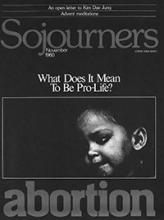Margaret Mead wrote in her memoirs, Blackberry Winter, that she "felt strongly that a culture that rejected children was a bad culture." She made this judgment when she observed the Mundugumor, a people who "actively disliked children." In the debate on abortion, both pro- and anti-abortion proponents would agree in principle with Margaret Mead, a veteran feminist whom no movement ever fully claimed. The agreement itself is an indictment of our culture, one which more and more seems to see even the potential presence of a child as an evil to be refused. Take the 1978 Newsweek statistic that in this country one in every 2.8 conceptions ends in abortion, or the common assumption that a child in the lives of an unwed teenage couple would be more damaging to their growth and development than the violence of the saline solution or curette. Our culture sees children or their possibility as a new enemy which interferes with human potential and liberty.
Our society often pits the presence of children against personal fulfillment, which we believe comes through unfettered freedom to pursue one's individual lifestyle. In the end, more and more children fall by the wayside. Ostensibly, our culture is pursuing a higher quality of life for the living, but I believe it is running the risk of cutting itself off from the very life it wants to celebrate and revel in.
Read the Full Article

